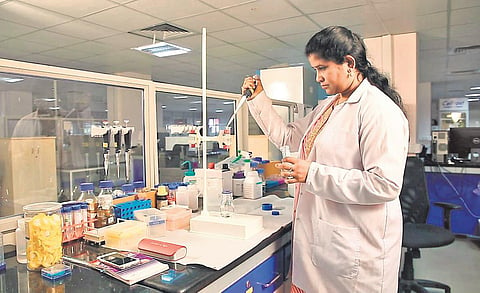

HYDERABAD: November 1 was World Vegan Day -- a day dedicated to raising awareness about the benefits of veganism, how it can help the environment and the need to stop killing animals for consumption. But many considering to make the switch worry about perhaps the only con of a vegan lifestyle, which is the reduced intake of protein. The lack of adequate protein can take a toll on the body as protein is essential for cellular function and is the building block of muscles. Also, the missing umami, which is essentially the taste and texture of meat, may be off-putting to many.
But, the Council Of Scientific And Industrial Research-Centre For Cellular And Molecular Biology (CSIR-CCMB), Hyderabad, is finding ways to bring about mass slaughter-free meat culture by retaining different tastes and textures of various muscle cells and edible organs, apart from working on making nature-identical proteins in their lab.
According to Dr N Madhusudhan Rao, CEO of Atal Incubation Centre - CCMB, the ‘con’ that complex protein can only come from a slaughtered animal is a myth that CCMB is trying to bust. “Avoiding cattle slaughter and doing away with the use of dairy products could reduce an individual’s carbon footprint from food by up to 70 per cent. Cultured meat is the need of the hour because we have to feed 10 billion people globally by 2050 by creating a platform for tasty, affordable protein,” he says.
Relying on steroids and synthetic growth hormones for cattle fattening is not sustainable as it has harmful effects on the human body. “Besides, the cattle industry uses a lot of antibiotics to keep livestock disease-free in congested spaces -- making the animal unhealthy for us,” he adds. According to him, cultured meat can be a healthier alternative as no steroids, growth hormones or antibiotics are used. It is nature-identical and non-synthetic because the scientists rely on tissue culture -- which involves taking a single cell or a tissue from a healthy animal and growing it in the lab. “Many companies have come up across the world, which are selling cultured meat, but, the texture remains flat. We are trying to culture meat by keeping its form, texture and taste in tact.
We are not compromising on complex proteins,” the scientist says. Soon, they will also be focusing on making meat-like texture and form using plant extracts for vegetarians. “Dairy-free dairy products to meat-free chicken, all these innovative foods are making it easy for people to treat their taste buds without harming animals,” says People for the Ethical Treatment of Animals (PETA) India Vegan Foods and nutrition specialist, Dr Kiran Ahuja. “We have companies in India making vegetarian shell-less eggs from peas, sorghum and other plants. Soya, almond, coconut, cashew and rice milks are already there. There is also plant-based ghee, buttermilk and cheese,” says Dr Kiran.
Experts have also hinted that in addition to sparing animals’ lives, turning vegan reduces the risk of chronic diseases and helps fight climate change. For instance, it’s known that Covid-19 came from a live-animal meat market, while SARS, swine flu and bird flu are also linked with confining and killing animals for food. “The world is seeing a slow vegetarian revolution because meat is not as safe as it was thought to be and it is not sustainable in the long run,” says Dr Madhusudhan.
While the world just celebrated World Vegan Day, many people planning to make the switch worry that they would be depriving their bodies of essential protein. But scientists at CCMB, who are working on making nature-identical proteins in their lab, say that it is possible to satisfy the craving for umami in a sustainable way